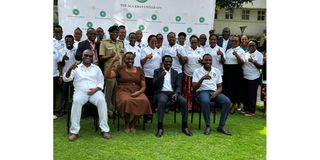Transforming healthcare: How Aga Khan University is empowering nurses in Tanzania

A group of healthcare nurses and midwives in a group photo shortly after a review session on the continous professional development programme by the Aga Khan university School of Nursing and Midwifery. PHOTO | COURTESY
What you need to know:
- For more than five years, the university has been offering training to nurses and midwives in the country to make them able to handle various cases
Dar es Salaam. The Aga Khan University School of Nursing and Midwifery-East Africa has taken a significant step to address various challenges in Tanzania’s health sector by strengthening the capacity of nurses and midwives across the country.
This initiative is timely, as the Tanzanian government is focusing on implementing a strategic plan to provide quality healthcare for all by 2030, experts say.
They add that achieving this goal without highly capable nurses is impossible.
For more than five years, the university has been offering training to nurses and midwives in the country to make them able to handle various cases.
“We have been training nurses and midwives to be able to care for patients who arrive at hospitals with critical care needs,” said Coordinator of Continuous Professional Development at the university, Mr Aminieli Usiri.
He made these remarks on July 27, 2024 during an evaluation meeting between the university and the beneficiaries of this training programme, which brought together representatives of nurses and midwives from the eight benefiting regions.
In previous years, the university provided training focused on maternal and child health, leadership and management in nursing, and patient-provider relationships.
“Most of this training was aimed at helping nurses and midwives use modern equipment, including machines to assist patients in critical condition,” Mr Usiri explained.
Coordinator for Clinical Services and Continuous Professional Development in the President’s Office-Regional Administration and Local Government Authorities (PO-RALG), Dr Pius Kamana, highlighted the vital role of nurses in healthcare.
“80 percent of all tasks performed in health centres, dispensaries, and hospitals are carried out by nurses. Therefore, by building the capacity of nurses, we are creating a large force that can help improve the provision of healthcare services in our hospitals,” Dr Kamana noted.
He added that 60 percent of all health sector workers, both in private and public sectors, are nurses.
“The Aga Khan made a good choice by enhancing the capabilities of a large group in the health sector to facilitate the journey of reaching many with quality services,” Dr Pius Kamana added.
The expansion of healthcare facilities in Tanzania underscores the need for well-trained nurses.
In 2015, Tanzania had only 77 municipal council hospitals, but now there are 182.
Health centres have increased from 488 to over 900, and dispensaries have risen from fewer than 4,800 to over 6,000.
“Therefore, Tanzania still needs competent service providers who are well-trained and have sufficient knowledge and skills to serve those in need,” Dr Kamana emphasised.
Mr Usiri echoed this sentiment, explaining how the programme has enabled nurses to assist patients requiring urgent services.
He noted that they have made efforts, although more work is still needed, as the government has expanded the scope of many health centres with emergency and critical care units.
However, nurses still need training to be able to use these facilities, he said.
He mentioned instances where modern machines were found in storage due to a lack of trained personnel to operate them.
“The understanding and capability of nurses to use these technological devices to facilitate treatment are still limited. We still need to ensure we reach more nurses to provide them with this understanding,” he said.
In the past two years, the programme has reached 332 nurses in eight regions: Dar es Salaam, Coast, Mwanza, Shinyanga, Arusha, Morogoro, and Mtwara.
Over the six years that AKU has been implementing this programme, more than 3,913 nurses have been trained in these regions.
“In addition to the face-to-face training we provide, we also offer other training through an online system with 14 courses, ensuring that nurses can access and learn. In the past two years, through this system, we have had 982 nurses who have completed and received certificates,” he said.
These training sessions are free of charge, and participants receive a completion certificate that can also help them obtain their work licenses.
Director of Nursing and Midwifery Services at Muhimbili National Hospital (MNH), Redemta Matindi, praised the initiative.
“Indeed, Aga Khan is one of the private sectors that support the government in ensuring healthcare services reach a high standard through various means, including continuous on-the-job training,” she said.
She noted the university’s efforts to reduce the skill gap and knowledge deficit in the health sector, particularly among nurses and midwives.
“This has continued to contribute to improving healthcare services in the country,” she added.
Meru District Council, Chief Nurse, Mr Elias Haali, highlighted the tangible benefits of the training.
“The training has enabled the beneficiaries to use modern equipment available in health centres that nurses and midwives would not have been able to use before,” she said.
He called for the programme's expansion to reach more nurses.
“We have 150 nurses; we need more stakeholders or Aga Khan to broaden its scope to reach more people,” he said.




